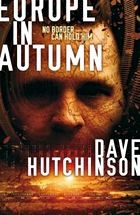Reading Europe In Autumn was more disorienting than usual for an alternate history. Not to put too fine a point on it, but the protagonist of this story set in a slightly-alt near-future Europe could easily have been a slightly-alt me, and not just in the sense that the author had created a sympathetic figure for readers to identify with. One of the book’s episodes takes place in an Estonian manor house where I nearly spent my summer vacation a couple of years back. Another takes place in mountains along the present Polish-Czech border, whereas my episode (which fortunately featured less drama) was in mountains along the present Polish-Slovak border. The protagonist starts off as a chef in Krakow and is rumored to be doing other things. I was doing other things in another Polish city (fortunately (again) not the kind of other things that the protagonist gets up to) while rumors circulated among friends that I was a chef. Or maybe the rumors went around while I was in Budapest; it’s been a while. The protagonist is inspired to become a chef by television shows featuring a chef who is the son of a Polish politician. I’ve met the politician. (Though not the son, who, in our time line, passed away suddenly in 2008.) Yet another episode takes place in Potsdam, not 10km from where I live now, and I’ve been to practically every location he goes to in Berlin. Fortunately (yet again), I’ve never found what he finds in a left-luggage locker at Zoo Station. I’m not sure how many of Hutchinson’s readers will have as many points of similarity as I did, but I found it all just a tad uncanny.
Rudi, the protagonist, is an Estonian, and as the story opens he is a cook at a restaurant in Krakow. One night, a group of Hungarian mafiosi come in, get drunk, and trash the place. Max, the owner, takes it in stride. After the Hungarians leave, Rudi observes that they should renegotiate the protection deal that is supposed to prevent such things, and Max observed that if their protection “had turned up tonight, half of us would have wound up in the mortuary.” It’s an introduction to a Europe where the chaotic years right after the fall of Communism never really settled down, where, in fact, the falling kept right on going, as states slid apart, small polities proliferated, borders sprang back up, and opportunities appeared in the gray zones around laws and borders.
Rudi himself slips into those, as a conversation with the restaurant’s protection becomes a talk about recruitment into a shadowy, continent-spanning network. This organization of couriers, smugglers, border-crossers, extraction units, possibly also spies and much more provides Rudi with training and the occasional mission. One of these goes, as a character says about an event later in the book, “badly off-piste,” and Rudi drops into a hall of mirrors that would do John Le Carré proud. Is he on the run, or is he doing just what Central wants him to do? Is there a Central at all? Hutchinson adds in an element of alternity that kicks a spy’s natural paranoia up a notch or three.
Each of the episodes has terrific suspense, and as different strands reappear, readers can see the larger piece that Hutchinson is weaving around Rudi’s tasks and misfortunes. Hutchinson deftly captures the different locales (I had some minor quibbles, but I am unusually close to the subject matter, and at any rate people obviously see the same places differently), and he makes each station of Rudi’s career stand out vividly, but in the muted tones of a Europe slowly falling apart, the leaves gradually falling off the tree of civilization. Hutchinson is also adept at not making his protagonist the sole moving part in his story’s world. Additional characters, antagonists and otherwise, develop off the page and away from Rudi. If some of the puzzles remain unsolved at the end, that’s entirely true to the tenor of a novel that’s much more hint and allegation than it is light and illumination.


1 pings
[…] in this volume) has learned to look in the course of the two previous books about fractured Europe (Europe in Autumn and Europe at Midnight). The death strip between East and West Germany is long gone, but as the […]